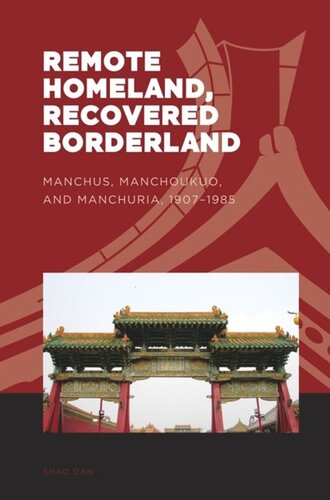

Most ebook files are in PDF format, so you can easily read them using various software such as Foxit Reader or directly on the Google Chrome browser.
Some ebook files are released by publishers in other formats such as .awz, .mobi, .epub, .fb2, etc. You may need to install specific software to read these formats on mobile/PC, such as Calibre.
Please read the tutorial at this link: https://ebookbell.com/faq
We offer FREE conversion to the popular formats you request; however, this may take some time. Therefore, right after payment, please email us, and we will try to provide the service as quickly as possible.
For some exceptional file formats or broken links (if any), please refrain from opening any disputes. Instead, email us first, and we will try to assist within a maximum of 6 hours.
EbookBell Team

0.0
0 reviewsRemote Homeland, Recovered Borderland addresses a long-ignored issue in the existing studies of community construction: How does the past failure of an ethnic people to maintain sovereignty over their homeland influence their contemporary reconfigurations of ethnic and national identities? To answer this question, Shao Dan focuses on the Manzus, the second largest non-Han group in contemporary China, whose cultural and historical ancestors, the Manchus, ruled China from 1644 to 1912. Based on deep and rigorous empirical research, Shao analyzes the major forces responsible for the transformation of Manchu identity from the ruling group of the Qing empire to the minority of minorities in China today: the de-territorialization and provincialization of Manchuria in the late Qing, the remaking of national borders and ethnic boundaries during the Sino-Japanese contestation over Manchuria, and the power of the state to re-categorize borderland populations and ascribe ethnic identity in post-Qing republican states.
Within the first half of the twentieth century, four regimes—the Qing empire under the Manchu royal clan, the Republic of China under the Nationalist Party, Manchuokuo under the Japanese Kanto Army, and the People’s Republic of China under the Communist Party—each grouped the Manchus into different ethnic and national categories while re-positioning Manchuria itself on their political maps in accordance with their differing definitions of statehood. During periods of state succession, Manchuria was transformed from the Manchu homeland in the Qing dynasty to an East Asian borderland in the early twentieth century, before becoming China’s territory recovered from the Japanese empire. As the transformation of territoriality took place, the hard boundaries of the Manchu community were reconfigured, its ways of self-identification reformed, and the space for its identity representations redefined.
Taking the borderland approach, Remote Homeland goes beyond the single-country focus and looks instead at regional and cross-border perspectives. It is a study of China, but one that transcends traditional historiographies. As such, it will be of interest to scholars of modern China, Japanese empire, and Northeast Asian history, as well as to those engaged in the study of borderlands, ethnic identity, nationalism, and imperialism.